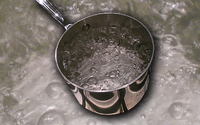Prevent Scalding Injuries

Scalding liquids constitute the number one cause for burning injuries among children. A scald is an injury caused by hot liquid or steam. According to the U.S. Consumer Product Safety Commission (CPSC), approximately 3,800 injuries and 34 deaths occur in the home each year due to scalding from excessively hot tap water. The majority of these accidents involve older adults and children under the age of five.
People of all ages can be burned by liquid at 140 degrees Fahrenheit in as few as thirty seconds. It takes only five seconds for a young child to be injured by 140 degree liquid; and only one second at 160 degrees.
Follow this simple advice to help reduce the risk of scald injuries at home.
- Never hold a child while drinking a hot liquid
- Always check to see that children and obstacles are out of your path before carrying hot liquids
- Turn pot handles to the back of the stove so children can't bump into them or pull them down.
- When young children are present, avoid using tablecloths and keep hot foods in the center of the table, out of reach
- Set your water heater at 120 degrees F or less or just below the medium setting
- Test the water before your children get in the tub.
- When children are in the tub, watch them closely.
- Use heavy pot holders when cooking.
- Keep children away from the range when you are cooking.
- Test micro-waved and heated food for heat before feeding young children.
- Take extra care removing the cover from microwaved food
- When drinking hot drinks, keep them away from the edge of tables and counters so children can not reach them.
- Do not put hot drinks on low tables, where children can reach them.
- Treat a minor burn injury immediately with cool running water for 3-5 minutes. Do not apply ice, which can harm the skin. Do not apply butter or lotions because this can keep the skin temperature hot, increasing the injury. Apply a sterile bandage to the injured area.
- If the scald is serious, get medical treatment fast.
Download our free scald prevention information sheet (PDF).

